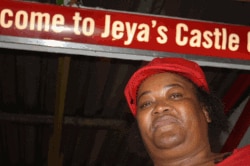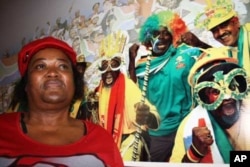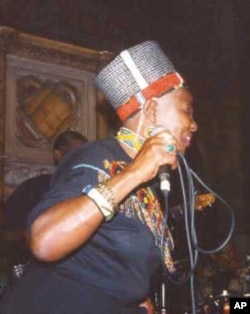Inside the Jeya Jazz Corner tavern, sweating cleaners are hard at work sweeping up the debris from the previous night’s party. Golden quart bottles of beer stand half-empty on top of plastic tables; half-smoked cigarettes, some pasted with lipstick, fill ashtrays. The chairs and tables are made of cheap white plastic. Some remain overturned on the unpolished stone floor by rowdy patrons. The dull tin roof seals in the smell of fatty ash from a smoldering fireplace, and of dried beer and sweat..
“We are part of the township, and proud of it. When people come here, they want to feel a township vibe, not a luxury vibe. We are not a fancy hotel. We are a shebeen,” says Noxolo Sume, using a South African word meaning “informal drinking den.”
She and her husband, Mawonga – popularly known as ‘Jeya,’ a nickname from when he played for South Africa’s national football team in the 1980s - own the venue in Port Elizabeth, on South Africa’s south coast. Ever since the country hosted the recent soccer World Cup, Jeya’s has been thronged with tourists from all over the world. It’s now making more money than the Sumes ever dreamed possible.
Yet while other shebeens across the country with similar windfalls are gentrifying and “moving away from their township roots,” as Noxolo puts it, she and her husband will do “no such thing.”
Prices kept cheap
Despite the fact that international visitors are now packing their tavern night after night, spending dollars, pounds, marks and yen as if there’s no tomorrow, the Sumes refuse to increase their prices.
“Our place is still in a township, New Brighton, where many people have no water and electricity. We are part of these poor people. We are real,” Noxolo emphasizes.
And that philosophy means Jeya’s offers real prices too, that can be afforded by poor local people. “The community where we (are based), it’s not a rich community. So we must look after that community,” says Noxolo.
The tavern charges little more than one US dollar for almost a liter of beer, and about three dollars for a huge plate of barbecued meat.
Mawonga explains, “We realized that after the international soccer fans had gone, we would be left with our loyal local customers. So we decided long before the tournament that we would not alienate them by raising prices.”
His wife adds, “You can have the support of many clients, but if you don’t have the people surrounding you supporting you, you are finished.”
Rich township music … and chakalaka
But his “joint” is “only just beginning!” Mawonga exclaims. He and his wife are traveling to tourism conferences around the world to market their business, and especially the music it offers. Not for nothing is it called the ‘Jazz Corner,’ with great artists such as Zimbabwean jazz diva Dorothy Masuka having performed here.
Noxolo, however, insists the venue isn’t limited to presenting only one musical genre. It also features traditional dancers, marimba bands, choirs and even artists who perform kwaito, a form of house music that originated in South Africa in the 1990s.
“It’s not only jazz music that’s distinctive in the township,” Noxolo says, justifying the tavern’s frequent abandonment of jazz as its staple sound.
And always true to the shebeen spirit, the music blasts from giant, battered speakers fixed crudely to the walls.
Jeya’s is also fast becoming known for the huge portions of food it serves its customers. “Hot meat served in a place that cares for them!” Noxolo says. “As long as you give them what is fresh, and what is healthy, and you give them love! That’s the best thing they want. They want a warm home!”
To accompany the enormous chunks of meat – often eaten by hand by customers, straight off the bone – she makes huge batches of her famous chakalaka, a dish unique to South African townships. “Chakalaka is…. sort of like a salad. It’s full of onions and peppers and beans,” Noxolo explains.
Germans and Chinese
Foreign tourists can’t seem to get enough of Jeya’s fare. The shebeen is particularly popular with Germans.
“I know Germans; they are conservative people,” says Noxolo. “But they are friendly; they communicate; they spend money, and they like fun. They dance; they vibe! They take off their jackets and ties! They say this country is full of ubuntu.”
Ubuntu is a South African philosophy which, loosely translated, means a “deep respect for one’s fellow human beings.”
Noxolo says some of her German clients during the World Cup were “high class people; really important people in Germany” who, because of pre-tournament paranoia about South Africa’s high crime rate, were accompanied to Jeya’s by “bunches” of personal bodyguards.
“But once the Germans realized how safe this place was,” laughs Mawonga, “they ordered their security guards to go back to their hotel and to leave them alone!”
On any given night, there’s also a fair smattering of Chinese visitors in the tavern … Although they find it impossible to pronounce Noxolo’s traditional Xhosa name…. So, she says, they’ve given her a new name – “Mama Jeya!”
Noxolo giggles, “The Chinese (speak) very fast when calling that name; they say, ‘Mama Jeya!’ And then I will know those (clients) are Chinese!”
English are the best
But it’s the hard-drinking, fast-spending English who remain her favorite customers.
“I usually say, ‘Don’t dance on top of the chairs; don’t do this!’ But the English people, they didn’t give me that chance,” Noxolo comments, explaining how English tourists often turn her tavern into a “full-on carnival.”
Sometimes, she says, when it’s the early hours of the morning and time for the tour buses to take the visitors from England back to their hotels, “they simply refuse to leave! They stand on tables and crates, drinking beer, one after another, and teaching us their songs!”
Noxolo maintains, too, that in stark contrast to just a few years ago, Jeya’s is now also regularly filled with white South Africans who previously declined to experience township culture. She enthuses, “I cannot believe this is the same place where just a few years ago, there was nothing but violence and dirt here. To see black and white people of all nationalities, from all over the world, coming together here at my place, is truly a privilege.”








